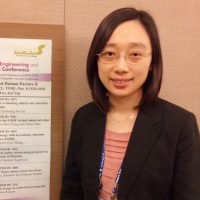涂芸芳
助理教授

現職
東吳大學資料科學系助理教授
研究領域
Generative AI in education, digital learning, user and learner behavior analysis, educational data mining, information literacy, mobile learning strategies, visual analytics, bibliometrics, social network analysis, and digital library studies.
課程
- 社群網絡分析
學歷
臺灣科技大學數位學習與教育研究所博士(105.09–108.06)
臺灣師範大學圖書資訊學研究所碩士 (101.09–104.06)
- Guest Editors, Special Issue on: “Artificial Intelligence-supported Adaptive and Self-regulated Learning in the Mobile Era.” International Journal of Mobile Learning and Organisation. (ESCI) (2024) https://www.inderscience.com/info/ingeneral/cfp.php?id=5868
- Guest Editors, Special Issue on: “Robotics-Facilitated Teaching and Learning: An Embodied Cognition and Multi-modal Perspective”. Educational Technology & Society (SSCI) (2025) https://www.j-ets.net/
- Co-Chair, C1 Learning Sciences & Computer-Supported Collaborative Learning, 29th Global Conference on Chinese Computer Education (GCCCE 2025)
- Executive Chair, C1 Learning Sciences & Computer-Supported Collaborative Learning, 28th Global Conference on Chinese Computer Education (GCCCE 2024)
- Co-Chair, C1 Learning Sciences & Computer-Supported Collaborative Learning, 27th Global Conference on Chinese Computer Education (GCCCE 2023)
Publications
Journal Articles
- Yun-Fang Tu and Gwo-Jen Hwang (2018). Trends of library-associated mobile learning based on a review of academic studies published from 2007 to 2016. The Electronic Library, 36(5), 875–891. https://doi.org/10.1108/EL-06-2017-0138 (SSCI, Q2)
- Yun-Fang Tu (2018). Factors affecting students’ behavioural intention in museum-based context-aware ubiquitous learning activities. International Journal of Mobile Learning and Organisation, 12(4), 311–335. (ESCI, Q1)
- Yun-Fang Tu and Gwo-Jen Hwang (2018). The roles of sensing technologies and learning strategies in library-associated mobile learning: a review of 2007-2016 journal publications. International Journal of Mobile Learning and Organisation, 12(1), 42–54. (ESCI)
- Yun-Fang Tu and Gwo-Jen Hwang (2020). Transformation of educational roles of library-supported mobile learning: A literature review from 2009 to 2018. The Electronic Library, 38 (4), 695–710. https://doi.org/10.1108/EL-10-2019-0230 (SSCI, Q2)
- Yun-Fang Tu and Gwo-Jen Hwang (2020). Trends and research issues of mobile learning studies in hospitality, leisure, sport and tourism education: a review of academic publications from 2002 to 2017. Interactive Learning Environments, 28(4), 385–403. https://doi.org/10.1080/10494820.2018.1528285 (SSCI, Q1)
- Hui-Chen Lin, Yun-Fang Tu, Gwo-Jen Hwang, and Hsin Huang (2021). From precision education to precision medicine. Educational Technology & Society, 24(1), 123–137. https://www.jstor.org/stable/26977862 (SSCI, Q1)
- Gwo-Jen Hwang and Yun-Fang Tu (2021). Roles and Research Trends of Artificial Intelligence in Mathematics Education: A Bibliometric Mapping Analysis and Systematic Review. Mathematics, 9(6), 584. https://doi.org/10.3390/math9060584 (SCI, Q1)
- Chenchen Liu, Ping Wan, Yun-Fang Tu, Kai Chen, and Youmei Wang (2021). A WSQ-based mobile peer assessment approach to enhancing university students’ vocal music skills and learning perceptions. Australasian Journal of Educational Technology, 37(6), 1–17. https://doi.org/10.14742/ajet.6832 (SSCI, Q1)
- Yun-Fang Tu, Shao-Chen Chang, and Gwo-Jen Hwang (2021). Analysing reader behaviours in self-service library stations using a bibliomining approach. The Electronic Library, 39(1), 1–16. https://doi.org/10.1108/EL-01-2020-0004 (SSCI, Q2)
- Yun-Fang Tu, Gwo-Jen Hwang, and Chiu-Lin Lai (2021). Facilitating learning by the visually impaired: Development and usability evaluation of a specially designed ubiquitous library. The Electronic Library, 39(1), 69–185. https://doi.org/10.1108/EL-10-2020-0284 (SSCI, Q2)
- Yun-Fang Tu, Gwo-Jen Hwang, Chao-Chen Chen, and Chiu-Lin Lai (2021). University students’ attitudes towards ubiquitous library-supported learning: an empirical investigation in the context of the Line@ Library. The Electronic Library, 39(1), 186–207. https://doi.org/10.1108/EL-03-2020-0076 (SSCI, Q2)
- Gwo-Jen Hwang, Yun-Fang Tu, and Chi-Jen Lin (2021) (2021). Advancements and hot research topics of artificial intelligence in mobile learning: A review of journal publications from 1995 to 2019. International Journal of Mobile Learning and Organisation, 15(4), 427. https://doi.org/10.1504/ijmlo.2021.118444 (ESCI, Q 1)
- Kai-Yu Tang, Chun-Hua Hsiao, Yun-Fang Tu, Gwo-Jen Hwang, amd Youmei Wang (2021). Factors influencing university teachers’ use of a mobile technology-enhanced teaching (MTT) platform. Educational Technology Research and Development, 69(5), 2705–2728. https://doi.org/10.1007/s11423-021-10032-5 (SSCI, Q1)
- Youmei Wang, Chenchen Liu, and Yun-Fang Tu (2021). Factors Affecting the Adoption of AI-Based Applications in Higher Education. Educational Technology & Society, 24(3), 116–129. https://www.jstor.org/stable/27032860 (SSCI, Q1)
- Yun-Fang Tu, Chiu-Lin Lai, Gwo-Jen Hwang, and Chun-Kuei Chen (2021). The role of hardiness in securities practitioners’ web-based continuing learning: Internet self-efficacy as a mediator. Educational Technology Research and Development, 69(5), 2547–2569. https://doi.org/10.1007/s11423-021-10038-z (SSCI, Q1)
- Yun-Fang Tu, Gwo-Jen Hwang, Shu-Yen Chen, Chiu-Lin Lai, and Chuan-Miao Chen (2021). Differences between LIS and non-LIS undergraduates’ conceptions of smart libraries: A drawing analysis approach. The Electronic Library, 39(6), 801–823. https://doi.org/10.1108/EL-07-2021-0129 (SSCI, Q2)
- Zhiqiang Wang, Yu Guo, Yan Wang, Yun-Fang Tu, and Chen-Chen Liu (2021). Technological solutions for sustainable development: Effects of a visual prompt scaffolding-based virtual reality approach on EFL learners’ reading comprehension, learning attitude, motivation, and anxiety. Sustainability, 13(24), 13977. https://doi.org/10.3390/su132413977 (SSCI, Q2)
- Chao-Chen Chen, Ning-Chiao Wang, Kai-Yu Tang, and Yun-Fang Tu (2022). Research issues of the top 100 cited articles on information literacy in higher education published from 2011 to 2020: A systematic review and co-citation network analysis. Australasian Journal of Educational Technology, 34–52. https://doi.org/10.14742/ajet.7695 (SSCI, Q1)
- Hui-Chun Chu, Gwo-Haur Hwang, Yun-Fang Tu, and Kai-Hsiang Yang (2022). Roles and research trends of artificial intelligence in higher education: A systematic review of the top 50 most-cited articles. Australasian Journal of Educational Technology, 15–35. https://doi.org/10.14742/ajet.7526 (SSCI, Q1)
- Shih-Ting Chu, Gwo-Jen Hwang, Yun-Fang Tu (2022). Artificial intelligence-based robots in education: A systematic review of selected SSCI publications. Computers and Education: Artificial Intelligence, 3, 100091. https://doi.org/10.1016/j.caeai.2022.100091 (Scopus)
- Jou-An Chen, Yun-Fang Tu, Gwo-Jen Hwang, and Jung-Feng Wu (2022). University librarians’ perspectives on an importance-performance analysis of authentication system attributes and their attitudes towards authentication log visualization. The Journal of Academic Librarianship, 48(4), 102528. https://doi.org/10.1016/j.acalib.2022.102528 (SSCI, Q2)
- Gwo-Jen Hwang, Yun-Fang Tu, and Kai-Yu Tang (2022). AI in online-learning research: Visualizing and interpreting the journal publications from 1997 to 2019. International Review of Research in Open and Distributed Learning (IRRODL), 23(1), 104–130. https://doi.org/10.19173/irrodl.v23i1.6319 (SSCI, Q1)
- Chun-Chun Chang, Gwo-Jen Hwang, and Yun-Fang Tu (2022). Concept mapping in technology-supported K-12 education: A systematic review of selected SSCI publications from 2001 to 2020. Journal of Educational Computing Research, 60(7), 1637-1662.https://doi.org/10.1177/07356331211073798 (SSCI, Q1)
- Min-Chi Chiu, Gwo-Jen Hwang, and Yun-Fang Tu (2022). Roles, applications, and research designs of robots in science education: A systematic review and bibliometric analysis of journal publications from 1996 to 2020. Interactive Learning Environments. https://doi.org/10.1080/10494820.2022.2129392 (SSCI, Q1)
- Youmei Wang, Xia Luo, Chen-Chen Liu, Yun-Fang Tu, and Naini Wang (2022). An Integrated Automatic Writing Evaluation and SVVR Approach to Improve Students’ EFL Writing Performance. Sustainability, 14(18), 11586. https://doi.org/10.3390/su141811586 (SSCI, Q2)
- Biyun Huang, Morris Siu-Yung Jong, Yun-Fang Tu, Gwo-Jen Hwang, Ching Sing Chai, and Michael Yi-Chao Jiang (2022). Trends and exemplary practices of STEM teacher professional development programs in K-12 contexts: A systematic review of empirical studies. Computers & Education, 189, 104577. https://doi.org/10.1016/j.compedu.2022.104577 (SSCI, Q1)
- Kai-Yu Tang, Chao-Chen Chen, Gwo-Jen Hwang, and Yun-Fang Tu (2022). Did library learners benefit from m-learning strategies? Research-based evidence from a co-citation network analysis of the literature. Educational Technology Research and Development, 70(5), 1719-1753. https://doi.org/10.1007/s11423-022-10136-6 (SSCI, Q1)
- Chen-Chen Liu, Chiu-Lin Lai, Gwo-Jen Hwang, and Yun-Fang Tu (2022). Effects of ASQE-based learning on the information literacy, problem-solving, and critical thinking of students with different growth mindsets. The Electronic Library, 40 (3), 269–290. https://doi.org/10.1108/EL-11-2021-0205 (SSCI, Q2)
- Chun-Kuei Chen, Yen-Ku Kuo, Yun-Fang Tu, and Gwo-Jen Hwang (2022). Employee attitudes towards ubiquitous library-supported professional learning. International Journal of Online Pedagogy and Course Design, 12(1), 1–15. https://doi.org/10.4018/ijopcd.295952 (ESCI, Q1)
- Chun-Chun Chang,Gwo-Jen Hwang,Yun-Fang Tu,Chiu-Lin Lai, and Biyun Huange (2022). Perceptions and conceptions of learning in smart healthcare technology contexts: a draw-a-picture analysis of the differences between nurses and nurse preceptors. Interactive Learning Environments. https://doi.org/10.1080/10494820.2022.2160469 (SSCI, Q1)
- Gwo-Jen Hwang, Po-Ya Chang, Wan-Yu Tseng, Chia-An Chou, Chih-Hsin Wu, and Yun-Fang Tu (2022). Research trends in artificial intelligence-associated nursing activities based on a review of academic studies published from 2001 to 2020. CIN: Computers, Informatics, Nursing. https://doi.org/10.1097/CIN.0000000000000897 (SSCI, Q2)
- Yun-Fang Tu, Chao-Chen Chen, Ning-Chiao Wang, Nalatpa Hunsapun, and Yi-Chin Chen (2023). A Comparison of Research Trends in Information Literacy in Higher Education of Asian and Non-Asian Countries. Information Literacy Education of Higher Education in Asian Countries, 31-61.
- Chen-Chen Liu, Gwo-Jen Hwang, Yun-Fang Tu, Yiqing, Yin, and Youmei Wang (2023). Research advancement and foci of mobile technology-supported music education: A systematic review and social network analysis on 2008-2019 academic publications. Interactive Learning Environments, 31(7), 4535–4554. https://doi.org/10.1080/10494820.2021.1974890 (SSCI, Q1)
- Chen-Chen Liu, Ping Wan, Gwo-Jen Hwang, Yun-Fang Tu, and Youmei Wang (2023). From competition to social interaction: a mobile team-based competition approach to promoting students’ professional identity and perceptions. Interactive Learning Environments, 31(2), 1158-1172. https://doi.org/10.1080/10494820.2020.1823855 (SSCI, Q1)
- Chi-Jen Lin, Kai-Yu Tang, and Yun-Fang Tu (2023). Advancements and research topics of museum-based mobile learning: A review of journal publications from 2008 to 2019. Interactive Learning Environments, 31(8), 4729-4752. https://doi.org/10.1080/10494820.2021.1981394 (SSCI, Q1)
- Kai‑Yu Tang, Yuen-Hsien Tseng, and Yun-Fang Tu (2023). Identifying mainstreams of contemporary digital reading research: Insights from a co-citation network analysis and systematic review. Interactive Learning Environments. https://doi.org/10.1080/10494820.2023.2192757 (SSCI, Q1)
- Chen-Chen Liu, Shi-Jie Liu, Gwo-Jen Hwang, Yun-Fang Tu, Youmei Wang, and Naini Wang (2023). Engaging EFL students’ critical thinking tendency and in-depth reflection in technology-based writing contexts: A peer assessment-incorporated automatic evaluation approach. Education and Information Technologies, 28(10), 13027-13052. https://doi.org/10.1007/s10639-023-11697-6 (SSCI, Q1)
- Chen-Chen Liu, Yu Guo, Gwo-Jen Hwang, Yun-Fang Tu, and Zhiqiang Wang (2023). Effects of an article-structure strategy-based spherical video-based virtual reality approach on EFL learners’ English reading comprehension and learning conceptions. Interactive Learning Environments. https://doi.org/10.1080/10494820.2022.2155840 (SSCI, Q1) (Published online: 14 Feb 2023)
- Chun-Chun Chang, Gwo-Jen Hwang, and Yun-Fang Tu (2023). Roles, applications, and trends of concept map-supported learning: A systematic review and bibliometric analysis of publications from 1992 to 2020 in selected educational technology journals. Interactive Learning Environment, 31(9), 5995-6016. https://doi.org/10.1080/10494820.2022.2027457 (SSCI, Q1)
- Chen-Chen Liu, Jierui Hou, Yun-Fang Tu, Youmei Wang, and Gwo-Jen Hwang (2023). Incorporating a reflective thinking promoting mechanism into artificial intelligence-supported English writing environments. Interactive Learning Environments, 31(9), 5614–5632. https://doi.org/10.1080/10494820.2021.2012812 (SSCI, Q1)
- Gwo-Jen Hwang, Yun-Fang Tu, and Hui-Chun Chu (2023). Conceptions of the metaverse in higher education: A draw-a-picture analysis and surveys to investigate the perceptions of students with different motivation levels. Computers & Education, 104868. https://doi.org/10.1016/j.compedu.2023.104868 (SSCI, Q1)
- Gang Yang, Dan Zheng, Ji-Huan Chen,Qun-Fang Zeng,Yun-Fang Tu, and Xiao-Li Zheng (2023). The effects of a role-play-based micro-game strategy on students’ computational thinking, learning engagement and learning motivation. Interactive Learning Environments. https://doi.org/10.1080/10494820.2023.2223239 (SSCI, Q1)
- Chen-Chen Liu, Dan Wang, Gwo-Jen Hwang,Yun-Fang Tu, Ning-Yu Li, and Youmei Wang (2023). Improving information discernment skills: through a concept mapping-based information evaluating framework in a gamified learning context. Interactive Learning Environments. https://doi.org/10.1080/10494820.2023.2205900 (SSCI, Q1)
- Gang Yang, Xiao-Qian Zheng, Qian Li, Miao Han, and Yun-Fang Tu (2023). An empirical study on how cognitive diagnostic feedback affects primary school pupils’ learning of Chinese writing. Interactive Learning Environments. https://doi.org/10.1080/10494820.2022.2159446 (SSCI, Q1)
- Xiao-Li Zheng, Xin-Yan Gu, Wen-Hua Lai, Yun-Fang Tu, Gwo-Jen Hwang, and Feng Wang (2023). Development of the social metacognition inventory for online collaborative argumentation: construct validity and reliability. Educational Technology Research and Development. https://doi.org/10.1007/s11423-023-10220-5 (SSCI, Q1)
- Yun-Fang Tu and Gwo-Jen Hwang (2023). University students’ conceptions of ChatGPT-supported learning: A drawing and epistemic network analysis. Interactive Learning Environments. https://doi.org/10.1080/10494820.2023.2286370 (SSCI, Q1)
- Chen-Chen Liu, Hai-Jie Wang, Dan Wanga,Yun-Fang Tu, Gwo-Jen Hwang, and Youmei Wang (2023). An interactive technological solution to foster preservice teachers’ theoretical knowledge and instructional design skills: a chatbot-based 5E learning approach. Interactive Learning Environments. https://doi.org/10.1080/10494820.2023.2277761 (SSCI, Q1)
- Gang Yang, Wei Zhou, Yu-Die Rong, Ya-Juan Xu, Qun-Fang Zeng and Yun-Fang Tu (2024). Designing a second-order progressive problem-based scaffold strategy to promote students’ writing performance in an SVVR environment. Education and Information Technologies. https://doi.org/10.1007/s10639-023-12418-9 (SSCI, Q1)
- Xiao-Li Zheng , Jun Huang , Xiao-Han Xia , Gwo-Jen Hwang , Yun-Fang Tu, Yi-Pin Huang, and Feng Wang (2023). Effects of online whiteboard-based collaborative argumentation scaffolds on group-level cognitive regulations, written argument skills and regulation patterns. Computers & Education, 207, 104920 https://doi.org/10.1016/j.compedu.2023.104920 (SSCI, Q1)
- Xinli, Zhang, Yuchen, Chen, Danqing, Li, Lailin, Hu, Gwo-Jen Hwang, and Yun-Fang Tu (2024). Engaging young students in effective robotics education: An embodied learning-based computer programming approach. Journal of Educational Computing Research, 62(2), 532–558. https://doi.org/10.1177/07356331231213548 (SSCI, Q1)
- Gang Yang, Wei Zhou, Huimin Zhou, Jiawen Li, Xiaodong Chen andYun-Fang Tu (2024). An empirical study of the effects of intelligent cognitive diagnostic feedback strategy on L2 writing performance, epistemic structure, and transferability. Education and Information Technologies, 29(2), 2183–2216. https://doi.org/10.1007/s10639-023-11905-3 (SSCI, Q1)
- Gwo-Jen Hwang, Kai-Yu Tang, and Yun-Fang Tu (2024). How artificial intelligence (AI) supports nursing education: Profiling the roles, applications, and trends of AI in nursing education research (1993–2020). Interactive Learning Environments, 32(1), 373–392. https://doi.org/10.1080/10494820.2022.2086579 (SSCI, Q1)
- Yun-Fang Tu (2024). Roles and functionalities of ChatGPT for students with different growth mindsets: Findings of drawing analysis. Educational Technology & Society, 27(1), 198-214. https://doi.org/10.30191/ETS.202401_27(1).TP01 (SSCI, Q1)
- Xiao-Li Zheng, Yun-Fang Tu, Gwo-Jen Hwang, Jue Yu, and Yuan-Bo Huang (2024). Interweaving of self-regulated learning and game-based learning in higher education: A review of academic publications from 2009 to 2020. Educational Technology Research and Development. https://doi.org/10.1007/s11423-024-10393-7 (SSCI, Q1)
- Yi-Pin Huang, Hoisoo Kim, Yingying Pan, Xiao-Li Zheng, and Yun-Fang Tu (2024). Promoting elementary school students’ programming learning: Effects of metacognitive vs. cognitive scaffolding. Journal of Research on Technology in Education. https://doi.org/10.1080/15391523.2024.2338086 (SSCI, Q1)
- Xinli, Zhang, Yuchen Chen, Lailin Hu, Yiwei Bao, Yun-Fang Tu, and Gwo-Jen Hwang (2024). A metaphor-based robot programming approach to facilitating young children’s computational thinking and positive learning behaviors. Computers & Education, 215, 105039. https://doi.org/10.1016/j.compedu.2024.105039 (SSCI, Q1)
- Chiu-Lin Lai, and Yun-Fang Tu (2024). Roles, strategies, and research issues of generative AI in the mobile learning Era. International Journal of Mobile Learning and Organisation, 18 (4), 516–537. https://doi.org/10.1504/IJMLO.2025.10059769 (ESCI, Q1)
- Yu-Ju Lan, Yi-Hsuan Chen, and Yun-Fang Tu (2024). Pre-service CFL Teachers’ Conceptions of and Attitudes Toward ICT and Image-GAI in Chinese Teaching: A Drawing Perspective. Educational Technology & Society, 27(4), 431-453. (SSCI, Q1)
- Yuchen Chen, Yun-Fang Tu, Xinli Zhang and Gwo-Jen Hwang (2024). Young children’s conceptions of robot programming learning. Educational Technology & Society, 27(4), 69-89. (SSCI, Q1)
- Tsui-Yuan, Chang, Gwo-Jen Hwang, and Yun-Fang Tu (2025).From realistic to idealistic online learning: A drawing analysis of the conceptions of university students with different self-regulation levels. Journal of Research on Technology in Education, 57(3), 609-626. https://doi.org/10.1080/15391523.2023.2287246 (SSCI, Q1)
- Xinli Zhang, Yuchen Chen, Lailin Hu,Juan Li, Gwo-Jen Hwang, and Yun-Fang Tu (2025). Promoting conceptual changes of artificial intelligence with technology-facilitated situational exploration and alternative thinking: A dual-situated learning model-based two-tier test approach. Interactive Learning Environments, 33(1), 837-862. https://doi.org/10.1080/10494820.2024.2361378 (SSCI, Q1)
- Zhi-Qiang Ma, Ling-Yu Kong, Yun-Fang Tu, Gwo-Jen Hwang, and Zi-Yun Lyu (2025). Strengthening collaborative argumentation with interactive guidance: A dialogic peer feedback approach based on the six thinking hats strategy. Interactive Learning Environments, 33(1), 296-320. (SSCI, Q1)
- Jian-Wen Fang, Jing Chen, Xiao-Ge Guo, Qing-Ke Fu, Gwo-Jen Hwang and Yun-Fang Tu (2025). Emotional supports in robot-based self-regulated learning contexts to promote pre-service teachers’ digital learning resource development competences. Education and Information Technologies, 30(5), 6483-6509. https://doi.org/10.1007/s10639-024-13059-2 (SSCI, Q1)
- Yingying Pan, Hoisoo Kim, Yipin Huang, Gwo-Jen Hwang, and Yun-Fang Tu (2025). Promoting students’ metacognition and self-regulatory efficacy through metacognitive scaffolding in mobile technology-enhanced interactive classrooms: The moderating role of inner speech. Education and Information Technologies, 30(8), 10811-10836. (SSCI, Q1)
- Hui-Chun Chu, Yi-Chun Lu and Yun-Fang Tu (2025). How GenAI-supported multi-modal presentations benefit students with different motivation levels: Evidence from digital storytelling performance, critical thinking awareness, and learning attitude. Educational Technology & Society, 28(1), 250-269. https://doi.org/10.30191/ETS.202501_28(1).TP02 (SSCI, Q1)
- Xin Cui, Zhi-Qiang Ma, Xin-Ya You, Yuchen Chen, Jia-Jia Yao, and Yun-Fang Tu (2025). Incorporating generative conversational agents into collaborative argumentation: Do different customization strategies matter? Educational Technology & Society, 28(2). https://doi.org/10.30191/ETS.202504_28(2).TP06 (SSCI, Q1)
- Zhi-Qiang Ma, Xin Cui, Wen-ping Liu, Yun-Fang Tu, and Gwo-Jen Hwang (2025). ChatGPT-assisted collaborative argumentation: Effects of role-playing prompts on students’ argumentation outcomes, processes, and perceptions. Educational Technology & Society, 28(3), 133-150. https://doi.org/10.30191/ETS.202507_28(3).SP09 (SSCI, Q1)
- Jian-Wen Fang, Jing Chen, Qiu-Lin Weng, Yun-Fang Tu, Gwo-Jen Hwang and Yi-Chen Xia (2025). Effects of a GenAI-based debugging approach integrating the reflective strategy on senior high school students’ learning performance and computational thinking. Educational Technology & Society, 28(3), 66-81. https://doi.org/10.30191/ETS.202507_28(3).SP06 (SSCI, Q1)
- Shih-Ting Chu, Chun-Chun Chang, and Yun-Fang Tu (2025). Concept maps in technological contexts of higher education: A systematic review of selected SSCI publications. Educational Technology Research and Development, 73, 1601–1622. (SSCI, Q1) (通訊)
- Chen-Chen Liu, Hai-Jie Wang, Gwo-Jen Hwang, Yun-Fang Tu, Youmei Wang, and Kai Chen (2025). Effects of Structural Reflection‐Promoting Mechanism‐Based Peer Assessment on Students’ Vocal Music Learning Performance and Perceptions. Journal of Computer Assisted Learning, 41(3), e70036.(SSCI, Q1)
- Xinli Zhang, Yuchen Chen, Lailin Hu, Gwo-Jen Hwang, and Yun-Fang Tu (2025). Developing preschool children’s computational thinking and executive functions: Unplugged vs. robot programming activities. International Journal of STEM Education. (SSCI, Q1)
- Chen-Chen Liu, Gwo-Jen Hwang, Peng Yu, Yun-Fang Tu, and Youmei Wang (2025). Effects of an automated corrective feedback-based peer assessment approach on students’ learning achievement, motivation, and self-regulated learning conceptions in foreign language pronunciation. Educational Technology Research and Development. https://doi.org/10.1007/s11423-025-10484-z (SSCI, Q1)
- Mu-Sheng Chen, Ting-Chia Hsu, and Yun-Fang Tu (2025). The use of learning analytics and educational data mining to analyze teachers’ teaching in online environments: a systematic literature review. Interactive Learning Environments., 33(5), 3317-3332. (SSCI, Q1)
- Chen-Chen Liu, Dan Wang, Xiaoqing Gu, Gwo-Jen Hwang, Yun-Fang Tu, and Youmei Wang (2025). Facilitating pre-service teachers’ instructional design and higher-order thinking with generative AI: an integrated approach with the peer assessment and concept map. Journal of Research on Technology in Education. https://doi.org/10.1080/15391523.2025.2474528 (SSCI, Q1)
- Chen-Chen Liu, Dan Wang, Hai-Jie Wang, Youmei Wang, and Yun-Fang Tu (2025). The effect of peer assessment-based collaborative concept mapping on pre-service teachers’ perceptions on smart learning environments. Journal of Research on Technology in Education. https://doi.org/10.1080/15391523.2025.2459126 (SSCI, Q1)
- Hsin Huang, Yun-Fang Tu, Gwo-Jen Hwang, Hui-Chen Lin and Dongpin Hu (2025). Contrasting nursing students’ and working staff’s conceptions and motivation of using smart technologies in medical contexts: a draw-a-picture technique and epistemic network analysis. Education and Information Technologies. https://doi.org/10.1007/s10639-025-13746-8 (SSCI, Q1)
- Jian-Wen Fang, Xiao-Ge Guo, Xiao-Pei Meng, Gwo-Jen Hwangc and Yun-Fang Tu (2025). Realization of parasocial interaction theory in STEAM education with an AI pedagogical agent: insights from learning performance, collaboration tendency, and problem-solving tendency. Interactive Learning Environments. https://doi.org/10.1080/10494820.2025.2508326 (SSCI, Q1)
- Gang Yang, Yu-Die Rong,Ya-Li Wang,You-You Zhang,Jun-Jie Yan and Yun-Fang Tu (2025). How generative artificial intelligence supported reflective strategies promote middle school students’ conceptual knowledge learning: an empirical study from China. Interactive Learning Environments. https://doi.org/10.1080/10494820.2025.2521339 (SSCI, Q1)
- Yuchen Chen, Xinli Zhang, Yun-Fang Tu, Gwo-Jen Hwang, and Lailin Hu (2025). Conceptions of image-generative AI-supported instruction of preservice teachers with different levels of learning attitude: a drawing and epistemic network analysis. Journal of Research on Technology in Education. https://doi.org/10.1080/15391523.2025.2478433 (SSCI, Q1)
- Yun-Fang Tu (2025). Advancements and paradigm shifts in mobile and ubiquitous learning: a bibliometric analysis of the 16 years of the International Journal of Mobile Learning and Organisation. International Journal of Mobile Learning and Organisation, 19(1), 113-134. (ESCI, Q1)
- Yi-Pin Huang, Rida Farah, Hoisoo Kim, Yingying Pan, Yun-Fang Tu, and Li-Hua Lei (2025). Exploring differences in the cognitive and metacognitive scaffolding use of high and low working memory students in block-based programming. Journal of Research on Technology in Education. https://doi.org/10.1080/15391523.2025.2557391 (SSCI, Q1)
- Xindong Ye, Xiaofen Shan, Yun-Fang Tu, & Yuanyuan Zhang (2025). Examining the Efficacy of Large Language Models for Mitigating Depression and Anxiety Among Chinese Students: A Randomized Controlled Trial. CIN: Computers, Informatics, Nursing, 10-1097. (SSCI, Q2)
- Chen-Chen Liu, Dan Wang, Gwo-Jen Hwang, Yun-Fang Tu,Youmei Wang, and Yana Su (2025). Promoting communication skills in virtual reality-based professional training contexts: a concept mapping-based inquiry communication framework. Interactive Learning Environment https://doi.org/10.1080/10494820.2025.2556806 (SSCI, Q1)
- Xinli Zhang, Ruiting Huang, Ruihua Zhang, Mingyi Li, Yun-Fang Tu, Yuchen Chen, Lailin Hu, Gwo-Jen Hwang (2025). AI‐Facilitated Article Revisions for Primary School Students With Writing Difficulties: Effects of a Large Language Model‐Based PDRPE Approach on Writing Performance, Attitude and Anxiety. Journal of Computer Assisted Learning, 41(5), e70131. https://doi.org/10.1111/jcal.70131 (SSCI, Q1)
- Yun-Fang Tu, Gwo-Jen Hwang, and Dongpin Hu. (2025). Effects on the learning achievement, approaches to learning, and multi-stage reflection quality of students with different levels of digital self-efficacy in a data literacy course: An ARCS-based self-reflective online learning model. Computers & Education, 238, 105397. https://doi.org/10.1016/j.compedu.2025.105397 (SSCI, Q1)
- Yuchen Chen, Xinli Zhang, Lailin Hu, Gwo-Jen Hwang, Haoran Xie, and Yun-Fang Tu. (2025). Incremental project-based robot programming: Effects on young children’s computational thinking, executive function, and learning behavioral patterns. Computers & Education, 105471. https://doi.org/10.1016/j.compedu.2025.105471 (SSCI, Q1)
- Jian-Wen Fang, Ting-Ting Ji, Yun-Fang Tu, Gwo-Jen Hwang, Di Zou, and Jing Chen (2025). Effects of a human-robot collaborative teaching approach on preschoolers’ social-emotional competence and learning behaviors. Computers & Education, 105469. https://doi.org/10.1016/j.compedu.2025.105469 (SSCI, Q1)
Journal Articles (Chinese)
- 陳俊魁、涂芸芳、賴秋琳 (2020)。探討證券從業人員網路自我效能、堅毅性以及網路學習態度之關係。臺灣科技大學人文社會學報,16(1),65–92。(通訊作者)
- 涂芸芳、黃國禎、陳俊魁 (2020)。圖書館支持行動學習的研究趨勢:2009-2018學術期刊文獻回顧。數位學習科技期刊,12(4),1–22。(TSSCI,第一作者)
- 張博雅、曾琬鈺、周家安、吳芷欣、涂芸芳 (2022)。1993~2020年人工智慧應用於護理的研究趨勢:文獻計量法。數位學習科技期刊,14(41),1–29。(TSSCI,通訊作者)
- 黃國禎、陳冠甫、涂芸芳 (2022)。虛擬實境在教育的國際研究與應用趨勢。教育研究月刊,340,105–132。
- 朱蕙君、涂芸芳、曾憲雄 (2022)。國家考試電腦化的國際趨勢與實施現況。國家菁英季刊,15(2),1–31。
- 黃國禎、方建文、涂芸芳 (2022)。人工智慧教育應用研究的全球圖景與趨勢。現代遠端教育研究,34(3),3–14。
- 涂芸芳、呂一淳、陳禹辰 (2024)。生成式人工智慧的國際教育應用及研究趨勢。教育研究月刊,365,170–189。
- 馬志強、尤欣雅、崔鑫、涂芸芳 (2024)。有序網路分析:面向教育會話互動關係多維刻畫的方法。現代遠距離教育,(06),49-59。
Books
- 陳昭珍、涂芸芳 (2021)。臺灣K-12資訊素養研究回顧與展望。在吳美美(主編),圖書資訊學研究回顧與前瞻0 (頁312–336)。台北市:元華文創。(雙盲)
- 黃國禎、涂芸芳、金玲、楊梅伶、白璃、邱敏棋(2023)。未來藝世界:AI 繪圖新旅程。新北市:斑馬線文庫有限公司。
- 黃國禎、涂芸芳 (2024)。生成式AI融入教育的理論、策略與研究設計。新北市:Ainosco Press (華藝學術出版)。(雙盲)
Conference Paper
- Yun-Fang Tu and Gwo-Jen Hwang (2018). Factors affecting students’ behavioral intention in museum-based context-aware ubiquitous gaming activities. Paper presented at the 3rd International Conference on Game-Based Learning (ICGBL2018), Hong Kong.
- Yun-Fang Tu and Gwo-Jen Hwang (2020). Usability assessment of a library-associated mobile learning app for the visually impaired. Paper presented at the 2020 International Conference on Open and Innovative Education (ICOIE 2020), Hong Kong.
- Chao-Chen Chen and Yun-Fang Tu (2020). Trend and research issues of information literacy about K-12 in Taiwan. Paper presented at the 2020 K-LISS/ I-LISS International Conference, South Korea.
- Chao-Chen Chen, Ning-Chiao Wang, Yun-Fang Tu, and Hsin-Ju Lin (2021). Research Trends from a Decade (2011–2020) for Information Literacy in Higher Education: Content and Bibliometric Mapping Analysis. Proceedings of the Association for Information Science and Technology, 58(1), 48–59. (Publication date: 13- Oct-2021)
- Chao-Chen Chen, Yun-Fang Tu, Yi-Chin Chen, Aciang Iku-Silan, and Fang-ya Chen (2023, November). Cultural Research Trends of Taiwan’s Indigenous Peoples, 2000–2021. In International Conference on Asian Digital Libraries (pp. 106-115). Singapore: Springer Nature Singapore.
- Fang-Ya Chen, Chao-Chen Chen, Yun-Fang Tu, and Hsiu-Ling Huang (2023, November). Integration Between Humanities and Technology: Using Digital Humanities Technology to Read the Gospel of Matthew. In International Conference on Asian Digital Libraries (pp. 116-121). Singapore: Springer Nature Singapore.
- Shu-Fang Hsieh, Gwo-Jen Hwang, and Yun-Fang Tu (2025, September). Behavioral Patterns of ELF Students with Different Levels of Learning Motivation in Digital Gaming Contexts. In International Conference on Learning Evidence and Analytics.

涂芸芳
助理教授
現職
東吳大學資料科學系助理教授
研究領域
Generative AI in education, digital learning, user and learner behavior analysis, educational data mining, information literacy, mobile learning strategies, visual analytics, bibliometrics, social network analysis, and digital library studies.
課程
- 社群網絡分析
學歷
臺灣科技大學數位學習與教育研究所博士(105.09–108.06)
臺灣師範大學圖書資訊學研究所碩士 (101.09–104.06)
- Guest Editors, Special Issue on: “Artificial Intelligence-supported Adaptive and Self-regulated Learning in the Mobile Era.” International Journal of Mobile Learning and Organisation. (ESCI) (2024) https://www.inderscience.com/info/ingeneral/cfp.php?id=5868
- Guest Editors, Special Issue on: “Robotics-Facilitated Teaching and Learning: An Embodied Cognition and Multi-modal Perspective”. Educational Technology & Society (SSCI) (2025) https://www.j-ets.net/
- Co-Chair, C1 Learning Sciences & Computer-Supported Collaborative Learning, 29th Global Conference on Chinese Computer Education (GCCCE 2025)
- Executive Chair, C1 Learning Sciences & Computer-Supported Collaborative Learning, 28th Global Conference on Chinese Computer Education (GCCCE 2024)
- Co-Chair, C1 Learning Sciences & Computer-Supported Collaborative Learning, 27th Global Conference on Chinese Computer Education (GCCCE 2023)
Publications
Journal Articles
- Yun-Fang Tu and Gwo-Jen Hwang (2018). Trends of library-associated mobile learning based on a review of academic studies published from 2007 to 2016. The Electronic Library, 36(5), 875–891. https://doi.org/10.1108/EL-06-2017-0138 (SSCI, Q2)
- Yun-Fang Tu (2018). Factors affecting students’ behavioural intention in museum-based context-aware ubiquitous learning activities. International Journal of Mobile Learning and Organisation, 12(4), 311–335. (ESCI, Q1)
- Yun-Fang Tu and Gwo-Jen Hwang (2018). The roles of sensing technologies and learning strategies in library-associated mobile learning: a review of 2007-2016 journal publications. International Journal of Mobile Learning and Organisation, 12(1), 42–54. (ESCI)
- Yun-Fang Tu and Gwo-Jen Hwang (2020). Transformation of educational roles of library-supported mobile learning: A literature review from 2009 to 2018. The Electronic Library, 38 (4), 695–710. https://doi.org/10.1108/EL-10-2019-0230 (SSCI, Q2)
- Yun-Fang Tu and Gwo-Jen Hwang (2020). Trends and research issues of mobile learning studies in hospitality, leisure, sport and tourism education: a review of academic publications from 2002 to 2017. Interactive Learning Environments, 28(4), 385–403. https://doi.org/10.1080/10494820.2018.1528285 (SSCI, Q1)
- Hui-Chen Lin, Yun-Fang Tu, Gwo-Jen Hwang, and Hsin Huang (2021). From precision education to precision medicine. Educational Technology & Society, 24(1), 123–137. https://www.jstor.org/stable/26977862 (SSCI, Q1)
- Gwo-Jen Hwang and Yun-Fang Tu (2021). Roles and Research Trends of Artificial Intelligence in Mathematics Education: A Bibliometric Mapping Analysis and Systematic Review. Mathematics, 9(6), 584. https://doi.org/10.3390/math9060584 (SCI, Q1)
- Chenchen Liu, Ping Wan, Yun-Fang Tu, Kai Chen, and Youmei Wang (2021). A WSQ-based mobile peer assessment approach to enhancing university students’ vocal music skills and learning perceptions. Australasian Journal of Educational Technology, 37(6), 1–17. https://doi.org/10.14742/ajet.6832 (SSCI, Q1)
- Yun-Fang Tu, Shao-Chen Chang, and Gwo-Jen Hwang (2021). Analysing reader behaviours in self-service library stations using a bibliomining approach. The Electronic Library, 39(1), 1–16. https://doi.org/10.1108/EL-01-2020-0004 (SSCI, Q2)
- Yun-Fang Tu, Gwo-Jen Hwang, and Chiu-Lin Lai (2021). Facilitating learning by the visually impaired: Development and usability evaluation of a specially designed ubiquitous library. The Electronic Library, 39(1), 69–185. https://doi.org/10.1108/EL-10-2020-0284 (SSCI, Q2)
- Yun-Fang Tu, Gwo-Jen Hwang, Chao-Chen Chen, and Chiu-Lin Lai (2021). University students’ attitudes towards ubiquitous library-supported learning: an empirical investigation in the context of the Line@ Library. The Electronic Library, 39(1), 186–207. https://doi.org/10.1108/EL-03-2020-0076 (SSCI, Q2)
- Gwo-Jen Hwang, Yun-Fang Tu, and Chi-Jen Lin (2021) (2021). Advancements and hot research topics of artificial intelligence in mobile learning: A review of journal publications from 1995 to 2019. International Journal of Mobile Learning and Organisation, 15(4), 427. https://doi.org/10.1504/ijmlo.2021.118444 (ESCI, Q 1)
- Kai-Yu Tang, Chun-Hua Hsiao, Yun-Fang Tu, Gwo-Jen Hwang, amd Youmei Wang (2021). Factors influencing university teachers’ use of a mobile technology-enhanced teaching (MTT) platform. Educational Technology Research and Development, 69(5), 2705–2728. https://doi.org/10.1007/s11423-021-10032-5 (SSCI, Q1)
- Youmei Wang, Chenchen Liu, and Yun-Fang Tu (2021). Factors Affecting the Adoption of AI-Based Applications in Higher Education. Educational Technology & Society, 24(3), 116–129. https://www.jstor.org/stable/27032860 (SSCI, Q1)
- Yun-Fang Tu, Chiu-Lin Lai, Gwo-Jen Hwang, and Chun-Kuei Chen (2021). The role of hardiness in securities practitioners’ web-based continuing learning: Internet self-efficacy as a mediator. Educational Technology Research and Development, 69(5), 2547–2569. https://doi.org/10.1007/s11423-021-10038-z (SSCI, Q1)
- Yun-Fang Tu, Gwo-Jen Hwang, Shu-Yen Chen, Chiu-Lin Lai, and Chuan-Miao Chen (2021). Differences between LIS and non-LIS undergraduates’ conceptions of smart libraries: A drawing analysis approach. The Electronic Library, 39(6), 801–823. https://doi.org/10.1108/EL-07-2021-0129 (SSCI, Q2)
- Zhiqiang Wang, Yu Guo, Yan Wang, Yun-Fang Tu, and Chen-Chen Liu (2021). Technological solutions for sustainable development: Effects of a visual prompt scaffolding-based virtual reality approach on EFL learners’ reading comprehension, learning attitude, motivation, and anxiety. Sustainability, 13(24), 13977. https://doi.org/10.3390/su132413977 (SSCI, Q2)
- Chao-Chen Chen, Ning-Chiao Wang, Kai-Yu Tang, and Yun-Fang Tu (2022). Research issues of the top 100 cited articles on information literacy in higher education published from 2011 to 2020: A systematic review and co-citation network analysis. Australasian Journal of Educational Technology, 34–52. https://doi.org/10.14742/ajet.7695 (SSCI, Q1)
- Hui-Chun Chu, Gwo-Haur Hwang, Yun-Fang Tu, and Kai-Hsiang Yang (2022). Roles and research trends of artificial intelligence in higher education: A systematic review of the top 50 most-cited articles. Australasian Journal of Educational Technology, 15–35. https://doi.org/10.14742/ajet.7526 (SSCI, Q1)
- Shih-Ting Chu, Gwo-Jen Hwang, Yun-Fang Tu (2022). Artificial intelligence-based robots in education: A systematic review of selected SSCI publications. Computers and Education: Artificial Intelligence, 3, 100091. https://doi.org/10.1016/j.caeai.2022.100091 (Scopus)
- Jou-An Chen, Yun-Fang Tu, Gwo-Jen Hwang, and Jung-Feng Wu (2022). University librarians’ perspectives on an importance-performance analysis of authentication system attributes and their attitudes towards authentication log visualization. The Journal of Academic Librarianship, 48(4), 102528. https://doi.org/10.1016/j.acalib.2022.102528 (SSCI, Q2)
- Gwo-Jen Hwang, Yun-Fang Tu, and Kai-Yu Tang (2022). AI in online-learning research: Visualizing and interpreting the journal publications from 1997 to 2019. International Review of Research in Open and Distributed Learning (IRRODL), 23(1), 104–130. https://doi.org/10.19173/irrodl.v23i1.6319 (SSCI, Q1)
- Chun-Chun Chang, Gwo-Jen Hwang, and Yun-Fang Tu (2022). Concept mapping in technology-supported K-12 education: A systematic review of selected SSCI publications from 2001 to 2020. Journal of Educational Computing Research, 60(7), 1637-1662.https://doi.org/10.1177/07356331211073798 (SSCI, Q1)
- Min-Chi Chiu, Gwo-Jen Hwang, and Yun-Fang Tu (2022). Roles, applications, and research designs of robots in science education: A systematic review and bibliometric analysis of journal publications from 1996 to 2020. Interactive Learning Environments. https://doi.org/10.1080/10494820.2022.2129392 (SSCI, Q1)
- Youmei Wang, Xia Luo, Chen-Chen Liu, Yun-Fang Tu, and Naini Wang (2022). An Integrated Automatic Writing Evaluation and SVVR Approach to Improve Students’ EFL Writing Performance. Sustainability, 14(18), 11586. https://doi.org/10.3390/su141811586 (SSCI, Q2)
- Biyun Huang, Morris Siu-Yung Jong, Yun-Fang Tu, Gwo-Jen Hwang, Ching Sing Chai, and Michael Yi-Chao Jiang (2022). Trends and exemplary practices of STEM teacher professional development programs in K-12 contexts: A systematic review of empirical studies. Computers & Education, 189, 104577. https://doi.org/10.1016/j.compedu.2022.104577 (SSCI, Q1)
- Kai-Yu Tang, Chao-Chen Chen, Gwo-Jen Hwang, and Yun-Fang Tu (2022). Did library learners benefit from m-learning strategies? Research-based evidence from a co-citation network analysis of the literature. Educational Technology Research and Development, 70(5), 1719-1753. https://doi.org/10.1007/s11423-022-10136-6 (SSCI, Q1)
- Chen-Chen Liu, Chiu-Lin Lai, Gwo-Jen Hwang, and Yun-Fang Tu (2022). Effects of ASQE-based learning on the information literacy, problem-solving, and critical thinking of students with different growth mindsets. The Electronic Library, 40 (3), 269–290. https://doi.org/10.1108/EL-11-2021-0205 (SSCI, Q2)
- Chun-Kuei Chen, Yen-Ku Kuo, Yun-Fang Tu, and Gwo-Jen Hwang (2022). Employee attitudes towards ubiquitous library-supported professional learning. International Journal of Online Pedagogy and Course Design, 12(1), 1–15. https://doi.org/10.4018/ijopcd.295952 (ESCI, Q1)
- Chun-Chun Chang,Gwo-Jen Hwang,Yun-Fang Tu,Chiu-Lin Lai, and Biyun Huange (2022). Perceptions and conceptions of learning in smart healthcare technology contexts: a draw-a-picture analysis of the differences between nurses and nurse preceptors. Interactive Learning Environments. https://doi.org/10.1080/10494820.2022.2160469 (SSCI, Q1)
- Gwo-Jen Hwang, Po-Ya Chang, Wan-Yu Tseng, Chia-An Chou, Chih-Hsin Wu, and Yun-Fang Tu (2022). Research trends in artificial intelligence-associated nursing activities based on a review of academic studies published from 2001 to 2020. CIN: Computers, Informatics, Nursing. https://doi.org/10.1097/CIN.0000000000000897 (SSCI, Q2)
- Yun-Fang Tu, Chao-Chen Chen, Ning-Chiao Wang, Nalatpa Hunsapun, and Yi-Chin Chen (2023). A Comparison of Research Trends in Information Literacy in Higher Education of Asian and Non-Asian Countries. Information Literacy Education of Higher Education in Asian Countries, 31-61.
- Chen-Chen Liu, Gwo-Jen Hwang, Yun-Fang Tu, Yiqing, Yin, and Youmei Wang (2023). Research advancement and foci of mobile technology-supported music education: A systematic review and social network analysis on 2008-2019 academic publications. Interactive Learning Environments, 31(7), 4535–4554. https://doi.org/10.1080/10494820.2021.1974890 (SSCI, Q1)
- Chen-Chen Liu, Ping Wan, Gwo-Jen Hwang, Yun-Fang Tu, and Youmei Wang (2023). From competition to social interaction: a mobile team-based competition approach to promoting students’ professional identity and perceptions. Interactive Learning Environments, 31(2), 1158-1172. https://doi.org/10.1080/10494820.2020.1823855 (SSCI, Q1)
- Chi-Jen Lin, Kai-Yu Tang, and Yun-Fang Tu (2023). Advancements and research topics of museum-based mobile learning: A review of journal publications from 2008 to 2019. Interactive Learning Environments, 31(8), 4729-4752. https://doi.org/10.1080/10494820.2021.1981394 (SSCI, Q1)
- Kai‑Yu Tang, Yuen-Hsien Tseng, and Yun-Fang Tu (2023). Identifying mainstreams of contemporary digital reading research: Insights from a co-citation network analysis and systematic review. Interactive Learning Environments. https://doi.org/10.1080/10494820.2023.2192757 (SSCI, Q1)
- Chen-Chen Liu, Shi-Jie Liu, Gwo-Jen Hwang, Yun-Fang Tu, Youmei Wang, and Naini Wang (2023). Engaging EFL students’ critical thinking tendency and in-depth reflection in technology-based writing contexts: A peer assessment-incorporated automatic evaluation approach. Education and Information Technologies, 28(10), 13027-13052. https://doi.org/10.1007/s10639-023-11697-6 (SSCI, Q1)
- Chen-Chen Liu, Yu Guo, Gwo-Jen Hwang, Yun-Fang Tu, and Zhiqiang Wang (2023). Effects of an article-structure strategy-based spherical video-based virtual reality approach on EFL learners’ English reading comprehension and learning conceptions. Interactive Learning Environments. https://doi.org/10.1080/10494820.2022.2155840 (SSCI, Q1) (Published online: 14 Feb 2023)
- Chun-Chun Chang, Gwo-Jen Hwang, and Yun-Fang Tu (2023). Roles, applications, and trends of concept map-supported learning: A systematic review and bibliometric analysis of publications from 1992 to 2020 in selected educational technology journals. Interactive Learning Environment, 31(9), 5995-6016. https://doi.org/10.1080/10494820.2022.2027457 (SSCI, Q1)
- Chen-Chen Liu, Jierui Hou, Yun-Fang Tu, Youmei Wang, and Gwo-Jen Hwang (2023). Incorporating a reflective thinking promoting mechanism into artificial intelligence-supported English writing environments. Interactive Learning Environments, 31(9), 5614–5632. https://doi.org/10.1080/10494820.2021.2012812 (SSCI, Q1)
- Gwo-Jen Hwang, Yun-Fang Tu, and Hui-Chun Chu (2023). Conceptions of the metaverse in higher education: A draw-a-picture analysis and surveys to investigate the perceptions of students with different motivation levels. Computers & Education, 104868. https://doi.org/10.1016/j.compedu.2023.104868 (SSCI, Q1)
- Gang Yang, Dan Zheng, Ji-Huan Chen,Qun-Fang Zeng,Yun-Fang Tu, and Xiao-Li Zheng (2023). The effects of a role-play-based micro-game strategy on students’ computational thinking, learning engagement and learning motivation. Interactive Learning Environments. https://doi.org/10.1080/10494820.2023.2223239 (SSCI, Q1)
- Chen-Chen Liu, Dan Wang, Gwo-Jen Hwang,Yun-Fang Tu, Ning-Yu Li, and Youmei Wang (2023). Improving information discernment skills: through a concept mapping-based information evaluating framework in a gamified learning context. Interactive Learning Environments. https://doi.org/10.1080/10494820.2023.2205900 (SSCI, Q1)
- Gang Yang, Xiao-Qian Zheng, Qian Li, Miao Han, and Yun-Fang Tu (2023). An empirical study on how cognitive diagnostic feedback affects primary school pupils’ learning of Chinese writing. Interactive Learning Environments. https://doi.org/10.1080/10494820.2022.2159446 (SSCI, Q1)
- Xiao-Li Zheng, Xin-Yan Gu, Wen-Hua Lai, Yun-Fang Tu, Gwo-Jen Hwang, and Feng Wang (2023). Development of the social metacognition inventory for online collaborative argumentation: construct validity and reliability. Educational Technology Research and Development. https://doi.org/10.1007/s11423-023-10220-5 (SSCI, Q1)
- Yun-Fang Tu and Gwo-Jen Hwang (2023). University students’ conceptions of ChatGPT-supported learning: A drawing and epistemic network analysis. Interactive Learning Environments. https://doi.org/10.1080/10494820.2023.2286370 (SSCI, Q1)
- Chen-Chen Liu, Hai-Jie Wang, Dan Wanga,Yun-Fang Tu, Gwo-Jen Hwang, and Youmei Wang (2023). An interactive technological solution to foster preservice teachers’ theoretical knowledge and instructional design skills: a chatbot-based 5E learning approach. Interactive Learning Environments. https://doi.org/10.1080/10494820.2023.2277761 (SSCI, Q1)
- Gang Yang, Wei Zhou, Yu-Die Rong, Ya-Juan Xu, Qun-Fang Zeng and Yun-Fang Tu (2024). Designing a second-order progressive problem-based scaffold strategy to promote students’ writing performance in an SVVR environment. Education and Information Technologies. https://doi.org/10.1007/s10639-023-12418-9 (SSCI, Q1)
- Xiao-Li Zheng , Jun Huang , Xiao-Han Xia , Gwo-Jen Hwang , Yun-Fang Tu, Yi-Pin Huang, and Feng Wang (2023). Effects of online whiteboard-based collaborative argumentation scaffolds on group-level cognitive regulations, written argument skills and regulation patterns. Computers & Education, 207, 104920 https://doi.org/10.1016/j.compedu.2023.104920 (SSCI, Q1)
- Xinli, Zhang, Yuchen, Chen, Danqing, Li, Lailin, Hu, Gwo-Jen Hwang, and Yun-Fang Tu (2024). Engaging young students in effective robotics education: An embodied learning-based computer programming approach. Journal of Educational Computing Research, 62(2), 532–558. https://doi.org/10.1177/07356331231213548 (SSCI, Q1)
- Gang Yang, Wei Zhou, Huimin Zhou, Jiawen Li, Xiaodong Chen andYun-Fang Tu (2024). An empirical study of the effects of intelligent cognitive diagnostic feedback strategy on L2 writing performance, epistemic structure, and transferability. Education and Information Technologies, 29(2), 2183–2216. https://doi.org/10.1007/s10639-023-11905-3 (SSCI, Q1)
- Gwo-Jen Hwang, Kai-Yu Tang, and Yun-Fang Tu (2024). How artificial intelligence (AI) supports nursing education: Profiling the roles, applications, and trends of AI in nursing education research (1993–2020). Interactive Learning Environments, 32(1), 373–392. https://doi.org/10.1080/10494820.2022.2086579 (SSCI, Q1)
- Yun-Fang Tu (2024). Roles and functionalities of ChatGPT for students with different growth mindsets: Findings of drawing analysis. Educational Technology & Society, 27(1), 198-214. https://doi.org/10.30191/ETS.202401_27(1).TP01 (SSCI, Q1)
- Xiao-Li Zheng, Yun-Fang Tu, Gwo-Jen Hwang, Jue Yu, and Yuan-Bo Huang (2024). Interweaving of self-regulated learning and game-based learning in higher education: A review of academic publications from 2009 to 2020. Educational Technology Research and Development. https://doi.org/10.1007/s11423-024-10393-7 (SSCI, Q1)
- Yi-Pin Huang, Hoisoo Kim, Yingying Pan, Xiao-Li Zheng, and Yun-Fang Tu (2024). Promoting elementary school students’ programming learning: Effects of metacognitive vs. cognitive scaffolding. Journal of Research on Technology in Education. https://doi.org/10.1080/15391523.2024.2338086 (SSCI, Q1)
- Xinli, Zhang, Yuchen Chen, Lailin Hu, Yiwei Bao, Yun-Fang Tu, and Gwo-Jen Hwang (2024). A metaphor-based robot programming approach to facilitating young children’s computational thinking and positive learning behaviors. Computers & Education, 215, 105039. https://doi.org/10.1016/j.compedu.2024.105039 (SSCI, Q1)
- Chiu-Lin Lai, and Yun-Fang Tu (2024). Roles, strategies, and research issues of generative AI in the mobile learning Era. International Journal of Mobile Learning and Organisation, 18 (4), 516–537. https://doi.org/10.1504/IJMLO.2025.10059769 (ESCI, Q1)
- Yu-Ju Lan, Yi-Hsuan Chen, and Yun-Fang Tu (2024). Pre-service CFL Teachers’ Conceptions of and Attitudes Toward ICT and Image-GAI in Chinese Teaching: A Drawing Perspective. Educational Technology & Society, 27(4), 431-453. (SSCI, Q1)
- Yuchen Chen, Yun-Fang Tu, Xinli Zhang and Gwo-Jen Hwang (2024). Young children’s conceptions of robot programming learning. Educational Technology & Society, 27(4), 69-89. (SSCI, Q1)
- Tsui-Yuan, Chang, Gwo-Jen Hwang, and Yun-Fang Tu (2025).From realistic to idealistic online learning: A drawing analysis of the conceptions of university students with different self-regulation levels. Journal of Research on Technology in Education, 57(3), 609-626. https://doi.org/10.1080/15391523.2023.2287246 (SSCI, Q1)
- Xinli Zhang, Yuchen Chen, Lailin Hu,Juan Li, Gwo-Jen Hwang, and Yun-Fang Tu (2025). Promoting conceptual changes of artificial intelligence with technology-facilitated situational exploration and alternative thinking: A dual-situated learning model-based two-tier test approach. Interactive Learning Environments, 33(1), 837-862. https://doi.org/10.1080/10494820.2024.2361378 (SSCI, Q1)
- Zhi-Qiang Ma, Ling-Yu Kong, Yun-Fang Tu, Gwo-Jen Hwang, and Zi-Yun Lyu (2025). Strengthening collaborative argumentation with interactive guidance: A dialogic peer feedback approach based on the six thinking hats strategy. Interactive Learning Environments, 33(1), 296-320. (SSCI, Q1)
- Jian-Wen Fang, Jing Chen, Xiao-Ge Guo, Qing-Ke Fu, Gwo-Jen Hwang and Yun-Fang Tu (2025). Emotional supports in robot-based self-regulated learning contexts to promote pre-service teachers’ digital learning resource development competences. Education and Information Technologies, 30(5), 6483-6509. https://doi.org/10.1007/s10639-024-13059-2 (SSCI, Q1)
- Yingying Pan, Hoisoo Kim, Yipin Huang, Gwo-Jen Hwang, and Yun-Fang Tu (2025). Promoting students’ metacognition and self-regulatory efficacy through metacognitive scaffolding in mobile technology-enhanced interactive classrooms: The moderating role of inner speech. Education and Information Technologies, 30(8), 10811-10836. (SSCI, Q1)
- Hui-Chun Chu, Yi-Chun Lu and Yun-Fang Tu (2025). How GenAI-supported multi-modal presentations benefit students with different motivation levels: Evidence from digital storytelling performance, critical thinking awareness, and learning attitude. Educational Technology & Society, 28(1), 250-269. https://doi.org/10.30191/ETS.202501_28(1).TP02 (SSCI, Q1)
- Xin Cui, Zhi-Qiang Ma, Xin-Ya You, Yuchen Chen, Jia-Jia Yao, and Yun-Fang Tu (2025). Incorporating generative conversational agents into collaborative argumentation: Do different customization strategies matter? Educational Technology & Society, 28(2). https://doi.org/10.30191/ETS.202504_28(2).TP06 (SSCI, Q1)
- Zhi-Qiang Ma, Xin Cui, Wen-ping Liu, Yun-Fang Tu, and Gwo-Jen Hwang (2025). ChatGPT-assisted collaborative argumentation: Effects of role-playing prompts on students’ argumentation outcomes, processes, and perceptions. Educational Technology & Society, 28(3), 133-150. https://doi.org/10.30191/ETS.202507_28(3).SP09 (SSCI, Q1)
- Jian-Wen Fang, Jing Chen, Qiu-Lin Weng, Yun-Fang Tu, Gwo-Jen Hwang and Yi-Chen Xia (2025). Effects of a GenAI-based debugging approach integrating the reflective strategy on senior high school students’ learning performance and computational thinking. Educational Technology & Society, 28(3), 66-81. https://doi.org/10.30191/ETS.202507_28(3).SP06 (SSCI, Q1)
- Shih-Ting Chu, Chun-Chun Chang, and Yun-Fang Tu (2025). Concept maps in technological contexts of higher education: A systematic review of selected SSCI publications. Educational Technology Research and Development, 73, 1601–1622. (SSCI, Q1) (通訊)
- Chen-Chen Liu, Hai-Jie Wang, Gwo-Jen Hwang, Yun-Fang Tu, Youmei Wang, and Kai Chen (2025). Effects of Structural Reflection‐Promoting Mechanism‐Based Peer Assessment on Students’ Vocal Music Learning Performance and Perceptions. Journal of Computer Assisted Learning, 41(3), e70036.(SSCI, Q1)
- Xinli Zhang, Yuchen Chen, Lailin Hu, Gwo-Jen Hwang, and Yun-Fang Tu (2025). Developing preschool children’s computational thinking and executive functions: Unplugged vs. robot programming activities. International Journal of STEM Education. (SSCI, Q1)
- Chen-Chen Liu, Gwo-Jen Hwang, Peng Yu, Yun-Fang Tu, and Youmei Wang (2025). Effects of an automated corrective feedback-based peer assessment approach on students’ learning achievement, motivation, and self-regulated learning conceptions in foreign language pronunciation. Educational Technology Research and Development. https://doi.org/10.1007/s11423-025-10484-z (SSCI, Q1)
- Mu-Sheng Chen, Ting-Chia Hsu, and Yun-Fang Tu (2025). The use of learning analytics and educational data mining to analyze teachers’ teaching in online environments: a systematic literature review. Interactive Learning Environments., 33(5), 3317-3332. (SSCI, Q1)
- Chen-Chen Liu, Dan Wang, Xiaoqing Gu, Gwo-Jen Hwang, Yun-Fang Tu, and Youmei Wang (2025). Facilitating pre-service teachers’ instructional design and higher-order thinking with generative AI: an integrated approach with the peer assessment and concept map. Journal of Research on Technology in Education. https://doi.org/10.1080/15391523.2025.2474528 (SSCI, Q1)
- Chen-Chen Liu, Dan Wang, Hai-Jie Wang, Youmei Wang, and Yun-Fang Tu (2025). The effect of peer assessment-based collaborative concept mapping on pre-service teachers’ perceptions on smart learning environments. Journal of Research on Technology in Education. https://doi.org/10.1080/15391523.2025.2459126 (SSCI, Q1)
- Hsin Huang, Yun-Fang Tu, Gwo-Jen Hwang, Hui-Chen Lin and Dongpin Hu (2025). Contrasting nursing students’ and working staff’s conceptions and motivation of using smart technologies in medical contexts: a draw-a-picture technique and epistemic network analysis. Education and Information Technologies. https://doi.org/10.1007/s10639-025-13746-8 (SSCI, Q1)
- Jian-Wen Fang, Xiao-Ge Guo, Xiao-Pei Meng, Gwo-Jen Hwangc and Yun-Fang Tu (2025). Realization of parasocial interaction theory in STEAM education with an AI pedagogical agent: insights from learning performance, collaboration tendency, and problem-solving tendency. Interactive Learning Environments. https://doi.org/10.1080/10494820.2025.2508326 (SSCI, Q1)
- Gang Yang, Yu-Die Rong,Ya-Li Wang,You-You Zhang,Jun-Jie Yan and Yun-Fang Tu (2025). How generative artificial intelligence supported reflective strategies promote middle school students’ conceptual knowledge learning: an empirical study from China. Interactive Learning Environments. https://doi.org/10.1080/10494820.2025.2521339 (SSCI, Q1)
- Yuchen Chen, Xinli Zhang, Yun-Fang Tu, Gwo-Jen Hwang, and Lailin Hu (2025). Conceptions of image-generative AI-supported instruction of preservice teachers with different levels of learning attitude: a drawing and epistemic network analysis. Journal of Research on Technology in Education. https://doi.org/10.1080/15391523.2025.2478433 (SSCI, Q1)
- Yun-Fang Tu (2025). Advancements and paradigm shifts in mobile and ubiquitous learning: a bibliometric analysis of the 16 years of the International Journal of Mobile Learning and Organisation. International Journal of Mobile Learning and Organisation, 19(1), 113-134. (ESCI, Q1)
- Yi-Pin Huang, Rida Farah, Hoisoo Kim, Yingying Pan, Yun-Fang Tu, and Li-Hua Lei (2025). Exploring differences in the cognitive and metacognitive scaffolding use of high and low working memory students in block-based programming. Journal of Research on Technology in Education. https://doi.org/10.1080/15391523.2025.2557391 (SSCI, Q1)
- Xindong Ye, Xiaofen Shan, Yun-Fang Tu, & Yuanyuan Zhang (2025). Examining the Efficacy of Large Language Models for Mitigating Depression and Anxiety Among Chinese Students: A Randomized Controlled Trial. CIN: Computers, Informatics, Nursing, 10-1097. (SSCI, Q2)
- Chen-Chen Liu, Dan Wang, Gwo-Jen Hwang, Yun-Fang Tu,Youmei Wang, and Yana Su (2025). Promoting communication skills in virtual reality-based professional training contexts: a concept mapping-based inquiry communication framework. Interactive Learning Environment https://doi.org/10.1080/10494820.2025.2556806 (SSCI, Q1)
- Xinli Zhang, Ruiting Huang, Ruihua Zhang, Mingyi Li, Yun-Fang Tu, Yuchen Chen, Lailin Hu, Gwo-Jen Hwang (2025). AI‐Facilitated Article Revisions for Primary School Students With Writing Difficulties: Effects of a Large Language Model‐Based PDRPE Approach on Writing Performance, Attitude and Anxiety. Journal of Computer Assisted Learning, 41(5), e70131. https://doi.org/10.1111/jcal.70131 (SSCI, Q1)
- Yun-Fang Tu, Gwo-Jen Hwang, and Dongpin Hu. (2025). Effects on the learning achievement, approaches to learning, and multi-stage reflection quality of students with different levels of digital self-efficacy in a data literacy course: An ARCS-based self-reflective online learning model. Computers & Education, 238, 105397. https://doi.org/10.1016/j.compedu.2025.105397 (SSCI, Q1)
- Yuchen Chen, Xinli Zhang, Lailin Hu, Gwo-Jen Hwang, Haoran Xie, and Yun-Fang Tu. (2025). Incremental project-based robot programming: Effects on young children’s computational thinking, executive function, and learning behavioral patterns. Computers & Education, 105471. https://doi.org/10.1016/j.compedu.2025.105471 (SSCI, Q1)
- Jian-Wen Fang, Ting-Ting Ji, Yun-Fang Tu, Gwo-Jen Hwang, Di Zou, and Jing Chen (2025). Effects of a human-robot collaborative teaching approach on preschoolers’ social-emotional competence and learning behaviors. Computers & Education, 105469. https://doi.org/10.1016/j.compedu.2025.105469 (SSCI, Q1)
Journal Articles (Chinese)
- 陳俊魁、涂芸芳、賴秋琳 (2020)。探討證券從業人員網路自我效能、堅毅性以及網路學習態度之關係。臺灣科技大學人文社會學報,16(1),65–92。(通訊作者)
- 涂芸芳、黃國禎、陳俊魁 (2020)。圖書館支持行動學習的研究趨勢:2009-2018學術期刊文獻回顧。數位學習科技期刊,12(4),1–22。(TSSCI,第一作者)
- 張博雅、曾琬鈺、周家安、吳芷欣、涂芸芳 (2022)。1993~2020年人工智慧應用於護理的研究趨勢:文獻計量法。數位學習科技期刊,14(41),1–29。(TSSCI,通訊作者)
- 黃國禎、陳冠甫、涂芸芳 (2022)。虛擬實境在教育的國際研究與應用趨勢。教育研究月刊,340,105–132。
- 朱蕙君、涂芸芳、曾憲雄 (2022)。國家考試電腦化的國際趨勢與實施現況。國家菁英季刊,15(2),1–31。
- 黃國禎、方建文、涂芸芳 (2022)。人工智慧教育應用研究的全球圖景與趨勢。現代遠端教育研究,34(3),3–14。
- 涂芸芳、呂一淳、陳禹辰 (2024)。生成式人工智慧的國際教育應用及研究趨勢。教育研究月刊,365,170–189。
- 馬志強、尤欣雅、崔鑫、涂芸芳 (2024)。有序網路分析:面向教育會話互動關係多維刻畫的方法。現代遠距離教育,(06),49-59。
Books
- 陳昭珍、涂芸芳 (2021)。臺灣K-12資訊素養研究回顧與展望。在吳美美(主編),圖書資訊學研究回顧與前瞻0 (頁312–336)。台北市:元華文創。(雙盲)
- 黃國禎、涂芸芳、金玲、楊梅伶、白璃、邱敏棋(2023)。未來藝世界:AI 繪圖新旅程。新北市:斑馬線文庫有限公司。
- 黃國禎、涂芸芳 (2024)。生成式AI融入教育的理論、策略與研究設計。新北市:Ainosco Press (華藝學術出版)。(雙盲)
Conference Paper
- Yun-Fang Tu and Gwo-Jen Hwang (2018). Factors affecting students’ behavioral intention in museum-based context-aware ubiquitous gaming activities. Paper presented at the 3rd International Conference on Game-Based Learning (ICGBL2018), Hong Kong.
- Yun-Fang Tu and Gwo-Jen Hwang (2020). Usability assessment of a library-associated mobile learning app for the visually impaired. Paper presented at the 2020 International Conference on Open and Innovative Education (ICOIE 2020), Hong Kong.
- Chao-Chen Chen and Yun-Fang Tu (2020). Trend and research issues of information literacy about K-12 in Taiwan. Paper presented at the 2020 K-LISS/ I-LISS International Conference, South Korea.
- Chao-Chen Chen, Ning-Chiao Wang, Yun-Fang Tu, and Hsin-Ju Lin (2021). Research Trends from a Decade (2011–2020) for Information Literacy in Higher Education: Content and Bibliometric Mapping Analysis. Proceedings of the Association for Information Science and Technology, 58(1), 48–59. (Publication date: 13- Oct-2021)
- Chao-Chen Chen, Yun-Fang Tu, Yi-Chin Chen, Aciang Iku-Silan, and Fang-ya Chen (2023, November). Cultural Research Trends of Taiwan’s Indigenous Peoples, 2000–2021. In International Conference on Asian Digital Libraries (pp. 106-115). Singapore: Springer Nature Singapore.
- Fang-Ya Chen, Chao-Chen Chen, Yun-Fang Tu, and Hsiu-Ling Huang (2023, November). Integration Between Humanities and Technology: Using Digital Humanities Technology to Read the Gospel of Matthew. In International Conference on Asian Digital Libraries (pp. 116-121). Singapore: Springer Nature Singapore.
- Shu-Fang Hsieh, Gwo-Jen Hwang, and Yun-Fang Tu (2025, September). Behavioral Patterns of ELF Students with Different Levels of Learning Motivation in Digital Gaming Contexts. In International Conference on Learning Evidence and Analytics.













